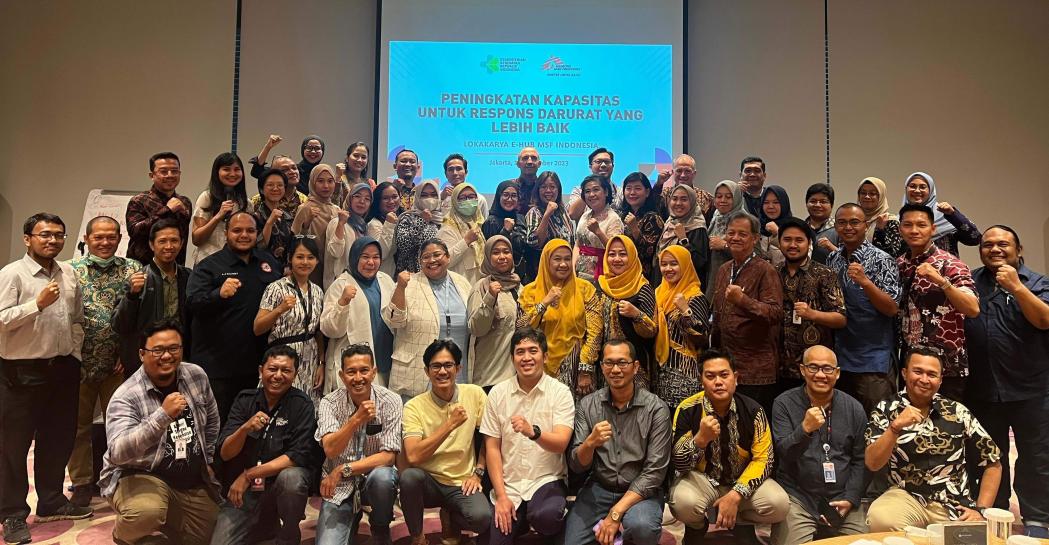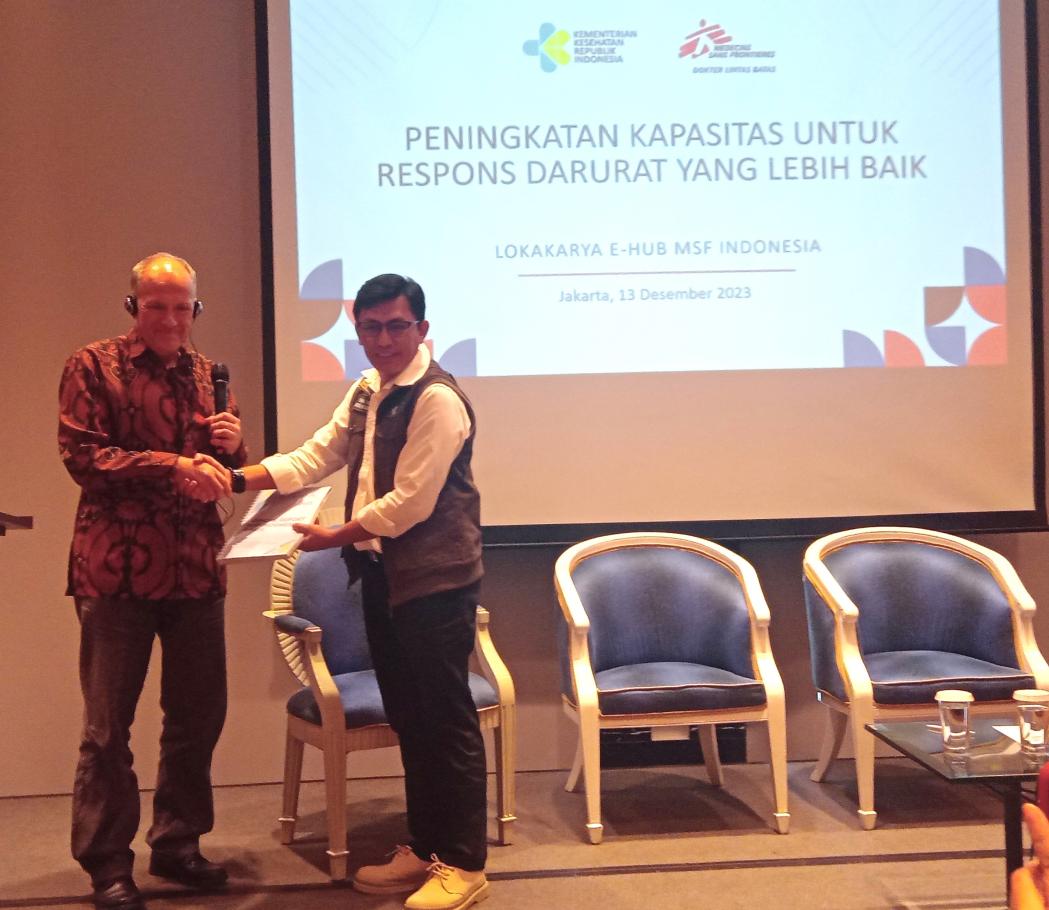Indonesia: Doctors Without Borders Contributes to Emergency Preparedness and Response through the E-Hub Initiative

A full-day workshop looking back at its achievements in 2023 and looking forward to its planning for 2024-2026 was conducted on Wednesday, December 13, 2023, in the southern part of Jakarta. © Cici Riesmasari/MSF
Doctors Without Borders / Médecins Sans Frontières (MSF) is proud to present the achievements of the first year of implementation of the E-Hub Project (Capacity Building Hub for Emergency Preparedness and Response). A full-day workshop looking back at its achievements in 2023 and looking forward to its planning for 2024-2026 was conducted on Wednesday, December 13, 2023, in the southern part of Jakarta.
This project is a new initiative aiming at capacity building in emergency preparedness and response for health care and non-health care workers and for community members committed to engage in medical emergency responses to health crisis in their communities. It is being developed and implemented in partnership with the Health Crisis Center of the Ministry of Health of the Republic of Indonesia. Its next 3 years of implementation is soon to be formalized through a new Memorandum of Understanding (MoU) between Doctors Without Borders Indonesia and the Ministry of Health for 2024 - 2026.
In the first quarter of 2023, the E-Hub Project introduced training programs in four distinct domains of medical emergency response. These programs are designed to address critical gaps, identified jointly with the Ministry of Health's Health Crisis Center (PKK), and building on Doctors Without Borders' expertise in medical emergency response.
The domains include (1) Medical Emergencies (organisation of health care services in emergencies, mass casualty incident management and management of outbreaks); (2) Mental Health and Psychosocial Support (MHPSS) in emergency contexts; (3) Data Management including use of Geographic Information Systems (GIS) in emergencies; and (4) Environmental Health during emergencies (with a focus on medical waste management in health care facilities but to soon extend to areas of water, hygiene and sanitation at community level).
Global experience and local involvement in emergency responses
Doctors Without Borders has been working for over 50 years and is currently operational in more than 70 countries. When emergencies or disasters such as floods or earthquakes happen anywhere around the world, Doctors Without Borders is often among the first organizations providing people with critical medical care and support including access to safe water, sanitation, food and shelter.
In recent years, the Doctors Without Borders team in Indonesia has been involved in medical emergency responses to various disasters in coordination with provincial, district and local health authorities, and in coordination with the MOH Health Crisis Centre which leads the Health Cluster response. With this extensive experience, the Doctors Without Borders team is confident in developing this capacity-building programme adapted to the needs and conditions of affected communities in Indonesia.
Here in Indonesia, Doctors Without Borders has agreed with the Ministry of Health to focus on capacity building, in order to strengthen the capacity for emergency preparedness and response. So, that’s how we developed the E-Hub project which really focuses on capacity building for emergency responders, medical and non-medical, working for organizations or in communities, who will be called upon to help in medical emergency responses to health crises. We welcome the efforts made by the Health Crisis Centre in setting up the reserve health force through the database of the Health Crisis Center, which will allow to mobilize emergency medical teams much quicker as part of the wider response.Dr. Roger Teck, Country Director

Dr. Roger Teck, Country Director of Doctors Without Borders Indonesia, submits the E-Hub Project report to Dr. Sumarjaya, Head of the Health Crisis Center at the Ministry of Health. © Aditya Rachmat/MSF
Left to right: Dr. Ira Cyndira Tresna (Head of the UN & Other Partnerships Working Team at the Health Crisis Center of MoH), Gabrielle Santi (Project Coordinator of Doctors Without Borders Indonesia E-Hub), Dr. Sumarjaya (Head of the Health Crisis Center at the Ministry of Health), Dr. Roger Teck (Country Director of Doctors Without Borders Indonesia), and Dr. Yoko Ratnasari (Deputy of Medical Doctor at Doctors Without Borders Indonesia). © Cici Riesmasari/MSF
Dr. Tutut Sri Purwanti, the Medical Activity Manager of E-Hub of Doctors Without Borders, presents the activities and achievements in 2023. Photo: © Cici Riesmasari/MSF
Throughout the workshop, E-Hub training supervisors provided a concise overview of their training program, emphasizing its focus on building emergency preparedness and response capacity. © Cici Riesmasari/MSF
The Ministry of Health is committed to creating a strong and efficient system in mitigation, preparedness and response on disaster management in a health crisis. We have worked with many partners, government, and nongovernment, national and international, especially in the pre-phase of health crisis. One of our partners is Doctors Without Borders. Its E-Hub project is one of the implementation programs led by Doctors Without Borders Indonesia through the Health Crisis Center, to improve the knowledge, skills and capacity of the health workers, to respond to emergencies professionally, effectively and efficiently.Dr. Sumarjaya, SKM, MM, MFP, C.F.A.
Dr. Sumarjaya as the Head of the Health Crisis Center at the Ministry of Health also added that the Health Crisis Center appreciates the Doctors Without Borders E-Hub project that has been running now for one year. Doctors Without Borders has provided training in medical emergencies, mental health and psychosocial support, data management and environmental health in emergencies for health workers and non-health workers in four districts, in Jakarta and Banten Provinces.
Achievements and way forward
Through the workshop, the Doctors Without Borders E-Hub team is showcasing its achievements, spreading knowledge of best practices, as well as sharing on the coming annual plans for E-Hub activities. This year, there were 18 training sessions conducted with as many as 466 people trained in Banten and Jakarta provinces. The participants comprised emergency responders of health centres and hospitals, staff of the district health offices and several organisations in DKI Jakarta and Banten provinces.
Dr. Roger Teck emphasized the objectives of this workshop: “We would like to share and reflect with our partners here on the achievements but also on the challenges and the lessons being learned while inviting our partners to express their expectations and suggestions the Doctors Without Borders E-Hub team is also looking forward to building more partnerships in 2024.”
The session involved listening to testimonials from four participants who attended each of the trainings conducted this year by the Doctors Without Borders E-Hub Team of the first developed curricula of the 4 E-Hub domains of capacity building (mental health, data management, medical emergencies and environmental health) sessions conducted by Doctors Without Borders Indonesia this year. © Cici Riesmasari/MSF
A participant, Dr. Istianah Hariyanti from Serang District Health Service (far right on the stage), highlighted the exceptional nature of the disaster emergency training conducted by Doctors Without Borders. She emphasized the training's unique focus on real-world context and hands-on experience in disaster situations. © Cici Riesmasari/MSF
Gabrielle Santi, the Project Coordinator of E-Hub, is presenting the project's future plans. The team is also eager to forge additional partnerships in 2024. © Cici Riesmasari/MSF
One of the small groups of workshop participants is engaging in discussions at the medical emergency corner during the carousel session, collecting ideas, inputs, and suggestions related to the future training curriculum of medical emergencies. © Rizki Aulianisa/MSF
One of the small groups of workshop participants is engaged in discussions at the mental health corner during the carousel session, gathering ideas, inputs, and suggestions for another related to the future training curriculum for mental health. © Cici Riesmasari/MSF
One of the small groups of workshop participants is engaging in discussions at the environmental health corner during the carousel session, collecting ideas, inputs, and suggestions to be covered by the next training curriculum on environmental health in emergencies related to the future training curriculum. © Cici Riesmasari/MSF
One of the small groups of workshop participants is engaging in discussions at the data management corner during the carousel session, collecting ideas, inputs, and suggestions to be covered by the next training curriculum to the future training curriculum. © Rizki Aulianisa/MS
A participant, Dr. Istianah Hariyanti from Serang District Health Service, highlighted the exceptional nature of the disaster emergency training conducted by Doctors Without Borders. She emphasized the training's unique focus on real-world context and hands-on experience in disaster situations. She commended the comprehensive training methodology, which not only imparts medical clinical skills but also offers guidance on how to efficiently coordinate amidst challenging disaster scenarios.
- Nurul Wulan Suci from Serang District Health Department
"I participated in the data management training, and although a disaster has not yet occurred, the knowledge acquired from the training proves valuable in everyday situations. In my professional role, we communicate information through bulletins. Previously, our bulletins solely presented case distribution data. However, post-training, we integrated immunization data from the past few years with case distribution figures. Consequently, we can now offer comprehensive and visually appealing information that is easily understandable to the general public, particularly to policymakers across various sectors and programs. I am confident that the recommendations we provide are now more precise and accurate."
- Dr. Istianah Hariyanti from Serang District Health Service
"I am a participant in the Health Services in Disaster Conditions training. Undoubtedly, the training conducted by Doctors Without Borders stands out, particularly in its emphasis on real-world context and experience in disaster situations. The training methodology is comprehensive, providing not only medical clinical skills but also guidance on how to effectively coordinate in the midst of disaster scenarios."
- Purwasih from Pandeglang District Health Service
"For our colleagues at Puskesmas, this training proves highly beneficial, especially given the accreditation activities we are undertaking this year. The practical sessions conducted by Doctors Without Borders allow participants to apply the technical guidelines firsthand, enhancing their understanding. Managing medical waste at the Community Health Center is now perceived as less complicated than initially imagined. The facilitators provided key insights, starting from sorting to containerization and storage, making it easier for us to grasp and implement the given information."
- Dr. Reni Anita Rahman from Sumur Health Center, Pandeglang District
"I work at the Sumur Community Health Center, an area highly prone to disasters. Throughout my tenure here, I have encountered tsunamis, earthquakes, flash floods, and whirlwinds. The Doctors Without Borders training has been instrumental in enhancing my knowledge base. Previously, as a doctor, my focus was primarily on treating individuals with physical ailments, and I lacked a comprehensive understanding of psychological management in the aftermath of disasters. In times of crisis, I often felt overwhelmed and uncertain about what actions to take. Following my participation in the training, just three days later, a whirlwind struck. This time, equipped with the knowledge gained, we were able to promptly apply what we had learned. We initiated an initial psychological approach and provided assistance to the affected victims, marking a significant improvement in our response capabilities."
Training participants' testimonies
About the E-Hub Project
The E-Hub project, known as the Capacity Building Hub for Emergency Preparedness and Response, is dedicated to creating educational opportunities for health crisis and disaster responders. The primary goal is to enhance community resilience, preparedness, and the responders' ability to handle emergencies professionally within Indonesia. For more information, visit www.msf.org/e-hub.